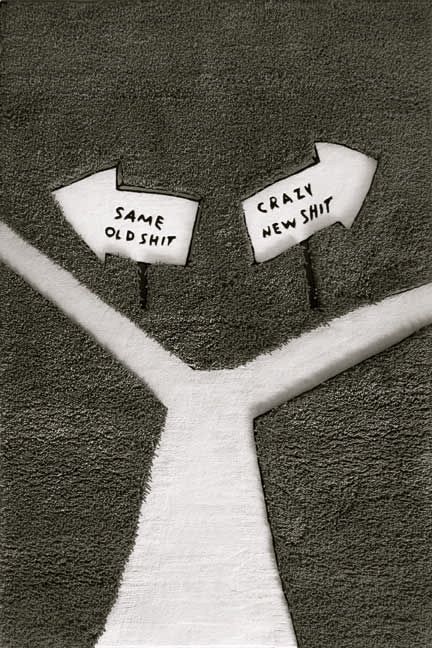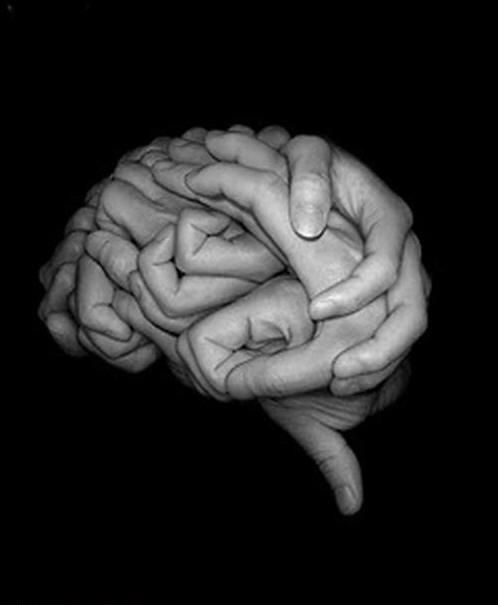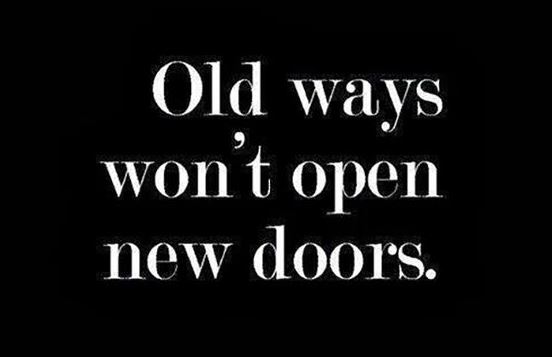Conditioned Communication = Unconscious Communication
Conditioned Communication = Unconscious Communication
You can only create choices when you consciously disengage from conditioned and conditional thinking!
Just like conditioned communication = unconscious communication, conditioned thinking = unconscious thinking. It is not mindful, nor present thinking. It is a repetitive repetition of re-actions you feel compelled to enact or react to, because you have been conditioned to think that this is the way things are done. Or the “right” way.
Conditioned is unconscious.
How do you know you’re doing this?
Think about what you’re doing and saying and then think about where it comes from and why.
Hear any familiar voices?
Feeling an old pain?
And so, over time, we become bogged down and stuck?
Why?
We keep making the same mistakes because we keep doing things unconsciously.
Our minds, conditioned by our experiences and past, filters out everything that isn’t familiar – no matter how painful. We stick to what we know. And the more we do that the more we believe we are right and justified in our “choices” or decisions.
Here’s the real problem – the universe will collude with you and give you all the back up you need to prove yourself right.
How very limiting
Conditionals start with “if” and there are different types of “if”.
If #1 is when we talk of things that are obvious in logic, fact, always true or they serve as a threat or warning. To make your “if” sentences sound all the more serious you replace the “if” with “when”.
If #2 is when you talk about future events that you are sure will happen. This is the “if” you use when you are making projections and forecasts into a future you really have no say over. Madness I tell you. It is all a cover up because your mind has no control over the future unknown and so it sticks and stays with what it knows. It remains afraid. And when you are afraid you don’t have choices.
If #3 is when you refer to future events that are hugely unlikely or a hypothetical dream you wish would come true.
If I had more time in my day I would…
And then you stop yourself because you hear a voice telling you it is whimsical, self-indulgent crazy shit.
If #4 is when we refer to past events that we regret or criticize.
When you are compelled to (still) act according to your conditioned thinking you’ll continue thinking, and speaking, in the 2nd and 3rd conditionals and then, much later, years from now, you’ll start speaking in the 4th!
Do you really want to do that?
You can make the new crazy shit a beautiful new reality by starting now, right here in your conscious present and taking steps in the other direction. One new brave courageous step at a time.
But, you absolutely need to take the other route.
Would you like to get some pointers on how to make making choices and decisions and going after crazy new shit more exciting? More fulfilling?
Contact me. And don’t if around for too long – there is, after all, no time like the present!
PS – None of this has to do with intelligence. There are highly qualified people who are disconnected from themselves and others. Unconscious connections through conditioned and learned behavior.
Hester Bergh-Appoyer
speaker | coach| cross-cultural connector | writer
vienna | cape town | goa | new york
Collaboration and Standing Ovations!
Did you know that the word collaboration comes from the Latin word “concerto” concert and harmony and from “concertare” to bring into agreement or sing together (as in con + cantare = to sing)?
I was raised on music – a well balanced mix from rock to pop and classics. The Beatles, Led Zeppelin, Moody Blues, Cat Stevens, Vivaldi, Tchaikovsky etc. A lot of time and money was spent on my “big C” cultural upbringing. I was indulged in many magical ballet performances by the local Performing Arts Council) and regularly dragged off to the open rehearsal sessions of the Durban Philharmonic Orchestra in the Durban City Hall.
What I really didn’t like was the instrument tuning and warming up that went on before a performance – to me it sounded like a cacophonous wailing. I needed the conductor to bring congruence and harmony to the clamor and commotion.
Our neighbors, were a family of musicians completely immersed in the world of classical music; they played in the orchestra, sang in choirs and taught music. Diana, one of the daughters, encouraged me to listen out for individual instruments, and to pick out the conducting elements (tempo, dynamics, cue-ing and articulation) as she had taught me to listen out for in Sergei Prokofiev’s “Peter and the Wolf”.
And then, as if by the wave of my very own baton I was skilled in aligning the instruments – discord became harmony! A symphony!
The word comes from the Latin “symphonia” a unison of sounds or harmony and from the Greek word “symphonia” also harmony and concert; “symphonos” meaning harmonious and from “syn”- together + phone – voice/sound.
Much of the interpersonal discord I have witnessed can be likened to the uncoordinated and un-conducted sounds of an orchestra warming up – much like the “forming” stage of a new team on a new project. Imagine you are a musician in a group of players where each musician thinks they know best and know what needs to be done (play what they have to play) when and how they want with little regard for the other musicians? Need I say more?
Achieving cross cultural collaboration must feel the same to a team, as an orchestra (and conductor) getting a standing ovation. It can only, happen when everyone; the leader(s) and team members pay finely tuned attention to the group and listen out for the individual “instruments” articulating their particular skills and talents in order to be instrumental in co-composing congruent collaboration.
This is cross-cultural competence; the ability to bring voices into agreement for conversational harmony. You want to play? Would you like to improve your skills? Contact me.
The “Q” in Cultural Competence – Do You Have It?
The “Q” In Cultural Competence – Do you Have It?
A 10 minute read on how to master your cross-cultural competence, a good book recommendation, a short video and 6 empowering questions that guarantee collaboration!
I was asked, just this week, what I do. I told them. Someone then said: What exactly is that?
In a nutshell? Culture is the way things get done around “here” and the way things get done around there, and over there and also over there. My job is to support people in bringing their various ways of doing things, together. In biz talk? Two words: team alignment.
Culture – is known as folklore, habit, knowledge, lifestyle, way of life and development. It is taken from “cultura”(Latin) which comes from the verb “colo” or “colere” which means to tend, care for, look after and cultivate. It also means to till the soil, farm, grow and plant.
What do I do? I tend, look after and cultivate cross-cultural connections and collaboration through clarity in conversation.
Why? To facilitate a change for the better people need to change their thinking and to change collective thinking demands a change in the conversations they are having which then leads to a “rewiring” of the brain (mindsets) and which ultimately leads to aligning new (and better) behaviors because…
But first we need to understand that modern day cultures can be described as the outcome of many different external influences and circumstances as experienced by those who set up home up in various parts of the world l-o-o-o-n-g before you and I came along.
The lessons in survival that were endured by one clan in the Saharan sun and heat, and another tribe wading their way through steamy mangrove swamps, had to be completely different to those of a group freezing their way through the Siberian cold and dark winter, don’t you agree? And, the frequency of their repeated “lessons” became genetically imprinted values and norms over time. “Solutions” became and continue to become a part of our everyday lives – we adopt, adapt, integrate and embody new sets of skills so often that basic assumptions become an unconscious and unquestioned reality which we, mostly, take for granted.
Repeated behavior, healthy or not, becomes a collective programming and an unquestioned group think. It’s this group think that defines a culture and creates differences. #groupbias #whywestereotype
The Sufi Judge – Why No One Answer is Ever Right!
The Sufi Judge
Why No One Answer Is Ever Right
What’s right?
Two men had an argument so they went to a Sufi judge to settle the dispute. The one made his case and was very persuasive in his reasoning. The judge nodded approval and said: “that’s right!”
The other man jumped up and said, “Wait a minute, you haven’t heard my side of the story!” The judge told him to make his case which he did, also with sound persuasive reasoning. The judge nodded approval and said: “that’s right!”
When the clerk of the court heard this he jumped up and said “Judge! They cannot both be right!” to which the judge replied, “That’s right”.
Just like truth is all around you there is no one answer that is right; what matters is where you put your energy and focus. And remember, the answers you get depend on the questions you ask.
So, what does this have to do with cross-cultural competence?
You tell me!
Wishing you an awesome week of finding alternative truths and new answers!






Recent Comments